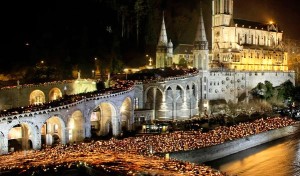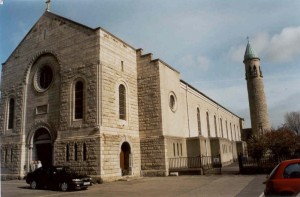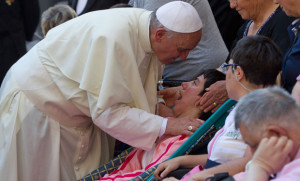
By Susan Gately - 06 February, 2016
 Thousands of pilgrims, many of them suffering with serious illnesses, go to Lourdes each year from Ireland.
Thousands of pilgrims, many of them suffering with serious illnesses, go to Lourdes each year from Ireland.
They are accompanied by helpers who, according to the Chairperson of the Dublin Diocesan World Day of the Sick committee “give up their time in a merciful and caring way” to serve the sick.
This year the annual conference marking the World Day of the Sick is focused on these people.
“Normally we charge €10 for the conference. This year we are waiving the charge as a thank you,” Trish Conway told CatholicIreland.net.
The meeting begins at 10am this morning and runs till 1pm at at the Talbot Hotel, Stillorgan Road, Co Dublin.
Bishop Donal Murray, Emeritus Bishop of Limerick and Professor J. Bernard Walsh, former Clinical Professor St James Hospital will reflect on the theme ‘the Lourdes experience’ focusing on Lourdes and the Year of Mercy.
Archbishop of Dublin, Dr Diarmuid Martin, will give the closing address.
Over 250 people are booked for the Conference but some places are still available. Between the talks, members of the three Lourdes Choirs will perform for the participants.
Although Ms Conway is not aware of instances of Irish pilgrims being physically healed at Lourdes, she says many find peace and tranquillity there.
“There is more emotional and spiritual healing and the sick often talk about their experiences with the volunteers and young people and the care they give them,” she says.

Church of Our Lady Queen of Peace, Merrion Row, Dublin
Tomorrow, Sunday 7 February, the focus on the sick will continue in the Dublin diocese with a Mass of Healing and Anointing of the Sick at 3pm in Our Lady Queen of Peace Church, Merrion Road, Dublin 4.
The actual World Day of the Sick is Thursday 11 February 2016, the Feast of Our Lady of Lourdes.
This year Pope Francis’ message focuses on the theme Entrusting Oneself to the Merciful Jesus like Mary: “Do whatever he tells you” based on the story of the wedding feast of Cana.
“Illness, above all grave illness, always places human existence in crisis and brings with it questions that dig deep,” writes Pope Francis.
“Our first response may at times be one of rebellion: Why has this happened to me? We can feel desperate, thinking that all is lost, that things no longer have meaning.”
In these situations, on the one hand faith in God is tested, yet at the same time it can reveal all of its positive resources, he says.
“Not because faith makes illness, pain, or the questions which they raise, disappear, but because it offers a key by which we can discover the deepest meaning of what we are experiencing; a key that helps us to see how illness can be the way to draw nearer to Jesus who walks at our side, weighed down by the Cross.”
 This key is given to us by Mary, our Mother, who has known this way at first hand, he says.
This key is given to us by Mary, our Mother, who has known this way at first hand, he says.
Jesus does not refuse the request of his mother (at the wedding of Cana). “How much hope there is in that event for all of us!”
In Mary’s concern we see reflected the tenderness of God, the Pope continues.
“This same tenderness is present in the lives of all those persons who attend the sick and understand their needs, even the most imperceptible ones, because they look upon them with eyes full of love.”
The World Day of the Sick is an initiative started by Pope John Paul II in 1992 and continued by Pope Benedict and Pope Francis.
Through it the whole Church bears witness to the tender mercy and love of God towards people who suffer. It also calls on Christians to pause and be prayerfully in solidarity with those who are sick and their carers.
The annual novena is currently taking place in Dublin’s Inchicore, with the torchlight procession on Thursday 11 February night. See http://www.dublindiocese.ie/our-lady-of-lourdes-novena/ and http://oblateparishinchicore.ie/ There is a full size replica of the Lourdes Grotto in Inchicore.